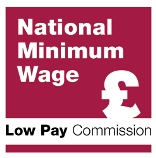The press release issued by the Low Pay Commission on 31 March 2023.
Low-paid workers across the country will receive a pay increase this weekend as all rates of the National Minimum Wage rise.
The National Living Wage (NLW) increases on Saturday 1 April by 9.7 per cent to £10.42, providing a pay rise to millions of workers aged 23 and over across the UK. 21-22 year olds will see their pay increase by 10.9 per cent to £10.18 per hour while pay for younger workers and apprentices will also rise by 9.7 per cent.
| NMW rate | Annual increase (£) | Annual increase (per cent) | |
|---|---|---|---|
| National Living Wage (23+) | £10.42 | 0.92 | 9.7 |
| 21-22 Year Old Rate | £10.18 | 1.00 | 10.9 |
| 18-20 Year Old Rate | £7.49 | 0.66 | 9.7 |
| 16-17 Year Old Rate | £5.28 | 0.47 | 9.7 |
| Apprentice Rate | £5.28 | 0.47 | 9.7 |
| Accommodation Offset | £9.10 | 0.40 | 4.6 |
These increases follow recommendations made to the Government by the Low Pay Commission (LPC) in the autumn. The NLW increase means another significant step towards reaching the Government’s target of two-thirds of median earnings by 2024. The increase is also expected to boost the real value of the NLW, restoring most of the real value lost since April 2021.
The LPC is now consulting on National Minimum Wage (NMW) rates for April 2024 and beyond and will make its recommendations to the Government in October. The consultation will run from 23 March to 9 June 2023. For more information, including how to submit responses, click here.
Bryan Sanderson, Chair of the Low Pay Commission, said:
From April, millions of workers will benefit from these increases to the NMW and NLW. Despite turbulent economic conditions, the labour market has remained strong and unemployment is low. We remain confident that this increase is unlikely to have a detrimental impact. Indeed, the high levels of inflation are felt more acutely by those on low pay who spend a higher proportion of their income on energy and food.
The new NLW rate keeps us on track to reach the Government’s target of two-thirds of median earnings by 2024. We estimate the NLW will need to rise next year to between £10.90 and £11.43 to meet this target. We also remain committed to lowering the NLW age threshold to 21 years of age in 2024.
In our consultation this year we are also looking beyond 2024, and inviting evidence and views on the future of minimum wage policy once the two-thirds target is achieved. The NMW is a central feature of the UK labour market and workers and employers alike will want to contribute to the debate about its future.
The LPC has published a short report which looks ahead at what the new rates will mean, and sets out an updated path of the NLW to its target of two-thirds of median hourly earnings by 2024. Estimating the forward path of the NLW is very challenging as earnings growth is difficult to measure and predict in the current economic climate. Our central estimate of the on-course rate of the NLW for 2024 is £11.16, within a range of £10.90 to £11.43.
